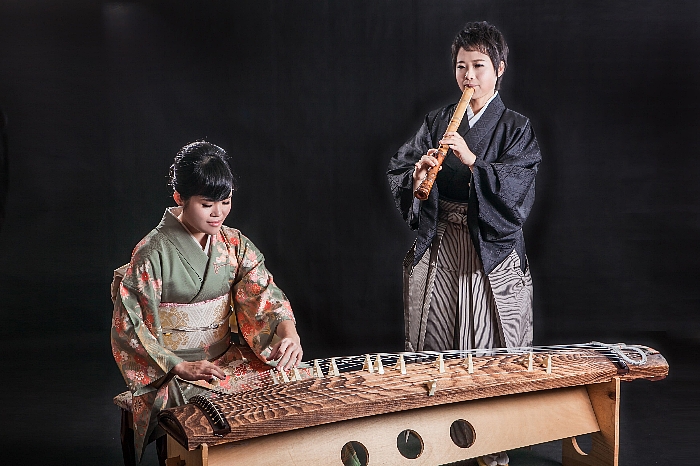PROFILE プロフィール

華之和音 / Hana no Waon
Profile
「華の和音」は尺八のリュウ・インロンと箏のシー・スーピンによって構成される邦楽ユニット。「華」は「花」のことで、さらに「中華」という意味も含まれている。「和」は日本文化の中での調和を愛する民族性と、合奏のことを意味している。「華の和音」は、花のような華麗なデュオを表現するという思いを込めた、中国の伝統音楽と日本の和楽器、両方の本質に迫るバイ・ミュージカリティを持つデュエットである。
《華の和音》は「華の和音」のメンバー、台湾演奏家のリュウ・インロン(劉穎蓉)とシー・スーピン(徐宿玶)、そして彼らの師事―宮田耕八朗、渡辺治子と共演する作品。彼らは学生時代から日本邦楽に触れ、「和の心」を感じ、日本に留学しに行くことにした。先生の指導を受けると同時に、邦楽コンクール、オーディション、公演などにも積極的に参加し、「八橋検校日本音楽コンクール」、「NHK邦楽オーディション」で見事受賞。
台湾帰国後には、邦楽をより多くの台湾人に届けたいという気持ちが溢れるようになり、華の和音を結成しようと決意した。発足以来、台湾各地で多数演奏会を開催するほか、アルバムの発表、日本音楽の講習会、著名な日本演奏家による講演などにも積極的に取り組み、日中音楽の交流へ努力を惜しみなく続けている。
《華の和音》は邦楽において最も代表的な楽器―箏と尺八を主とする。伝統邦楽曲だけでなく、明治維新に西洋音楽の影響を受け新たなジャンルを形成するに至った現代邦楽曲と台湾作曲家である陳泗治の作品のスペシャル改編曲も収録した。台湾奏者の演奏と豊かなジャンルの曲を通じ、台湾の人々に邦楽と日本伝統音楽の本質により深い興味を持ってもらい、その作品によって、交流の輪をどんどん広げていきたいと思っている。
Hana No Waon is a Japanese music ensemble based in Taiwan, composed of shakuhachi player Ying-Jung Liu and koto player Su-Ping Hsu. The name is given by Watanabe Haruko, the Great Teacher of Japanese Ikuta School. Hana means Flowers and Chinese, and Waon is an important concept in Japanese culture, meaning Harmony and Ensemble. Thus, Hana No Waon expresses the splendid duet like flowers, and besides Japanese music, they also perform Chinese music, making Hana No Waon a bi-musicality music ensemble.
Facebook :https://www.facebook.com/taiwan.hananowaon/
[Members]
尺八 ╱リュウ・インロン(劉穎蓉)
台湾南投県出身。国立台湾芸術大学中国音楽学科を経て、国立台南芸術大学民族音楽研究科修士を取得修了。かつて中国の竹笛を専攻し、国内及び海外複数の名家に師事。そして、尺八を宮田耕八朗に師事し、本格的に尺八修行を行っている。
2011年、NHK邦楽オーディションに合格し、台湾人で初めてNHKFMラジオ「邦楽のひととき」にて当時の演奏が全国放送された。同年、南芸大箏‧尺八楽団と共演したオリジナルアルバム「春の海」で伝統及び芸術音楽金曲奨に伝統音楽演奏賞を受賞候補とされる。その後、オーストリア、スペイン、日本、香港、中国などで海外公演を行い、高い評価を受ける。これまでに台湾国楽団首席客演指揮者である閻惠昌(エン・フェイチァン)と陳明志(チン・ミンシ)に作られた尺八、笛と薩摩琵琶のための協奏曲《風の歌を聴く》、名指揮者である瞿春泉(チュー・チェンチェン)と中国の竹笛の協奏曲《胡旋舞女》を共演。また国際尺八演奏家のジョン・海山・ネプチューン、柿堺香、福田輝久と共演し、好評を博している。伝統音楽の尺八表現を追求し続けるほか、現代邦楽においても積極的に進めており、尺八表現のさらなる可能性を求めている。
現在、「華の和音」リーダー、「台中青年絲竹楽団」団員。尚、国立台南芸術大学中国音楽学科と中国文化大学非常勤講師を務めるなど、後進の指導にも力を注ぐ。
劉穎蓉Ying-Jung Liu/ Chinese Flute, Xiao, Shakuhachi
From Nantou, Taiwan, Ying-Jung Liu finished her Bachelor degree from the Department of Chinese Music at the National Taiwan University of Arts and Master of Arts from the Graduate Institute of Ethnomusicology at the Tainan National University of the Arts. Majoring in the performance of Chinese Flute, Ms. Liu studied with many famous professors, teachers, and masters worldwide; she is now studying shakuhachi under the mentorship of the Japanese Shakuhachi master, Miyata Kouhachirou. In 2011, Ms Liu was qualified in the NHK Competition of Japanese Traditional Music to have her recording of Shika No Tohne broadcasted in Japan nationwide, which is a rare honor for foreign performers. In the same year, the recording Haru No Umi, in which she worked with the Ensemble of Koto and Shakuhachi at the Tainan National University of the Arts, was nominated for the Best Interpretation of Traditional Music in the 22nd Golden Melody Awards. In recent years, Ms. Liu toured in Austria, Japan, and China, and her performance received favorable review. In 2013, Ms. Liu played Chan Ming Chi’s Listening to the Wind’s Singing: Concerto for Shakuhachi, Dizi, and Satsuma-Biwa with the famous conductor Yan Hui Chang and the National Chinese Orchestra Taiwan, and performed with the world- renowned shakuhachi performer John Kaizan Neptune. Being passionate for the art of traditional shakuhachi music, Mr. Liu also devotes herself to modern music performance. She premiered Akokay by Austrian composer Wolfgang Liebhart and Zwischen Tanz und Gebet by Taiwanese composer Chia-Lin Pan, exploring the possibility of the combination of traditional and modern music. Ms. Liu is currently the chief director of Hana No Waon, a Japanese music ensemble based in Taiwan, lecturer of shakuhachi in the Department of Chinese Music at the Tainan National University of the Arts and Chinese Culture University , and also gives shakuhachi lessons in the Institute of Asia-Pacific Music at the Tainan National University of the Arts and Taiwan Shakuhachi Society.
箏 ╱シー・スーピン(徐宿玶)
台湾南投県出身。国立台南芸術大学中国音楽学科、国立台南芸術大学民族音楽研究科修士中国箏専攻卒業。中国箏を鄭德淵、黃俊錫、楊佩璇、丁承運、劉翠英、王文鈴、孫文姸(中国)の諸氏に師事。鄭德淵に箏曲の手ほどきを受け、その後、箏を生田流正派渡辺治子大師範、邦楽合奏を宮田耕八朗に学び、2013年より渡辺治子大師範に推薦され、野坂操壽に箏の指導を受ける。
2007年から2009年、日本に留学し、八橋検校日本音楽コンクール箏独奏部門第二位を受賞し、NHK邦楽オーディションに合格。当時の曲《草笛の頃》がNHKFMラジオ「邦楽のひととき」で全国放送され、台湾の箏奏者として初の快挙を果たした。また、東京紀尾井ホールで「箏の架け橋」ソロコンサートを開催。
帰国後、尺八演奏家リュウ・インロン(劉穎蓉)と邦楽ユニット「華の和音」を結成。2010年、国立台南芸術大学アジア音楽センターの箏講師として南芸大箏‧尺八楽団のオリジナルアルバム「春の海」の録音に参加し、伝統及び芸術音楽金曲奨に伝統音楽演奏賞を受賞候補という形で評価を受けた。
近年は日本、香港、中国、また台湾各地で出演オファーを受け、箏及び中国箏の演奏活動を続けている。国内外問わずさまざまな奏者との共演を行い、これまでに宮田耕八朗、ジョン・海山・ネプチューン、柿堺香、福田輝久、三橋貴風、星田一山、譚宝碩(尺八・蕭)など各界の頂点を極めている演奏家と共演。台湾各地で講習会、日本音楽の講演等、伝統音楽を多くの人に伝える活動を積極的に開催すると共に好評を博し、台湾の箏界に新しい息吹を吹き込む。
現在は国立台南芸術大学中国音楽学科非常勤講師。嘉義高校音楽班にも中国箏の指導活動に努め、それに副団長として箏、尺八によるユニット「華の和音」に所属し、活躍している。
徐宿玶 Su-Ping Hsu/Chinese zheng and Japanese koto
From Nantou, Taiwan, Su-Ping Hsu finished her bachelor degree from the Department of Chinese Music, and Master of Arts from the Graduate Institute of Ethnomusicology at the Tainan National University of the Arts. Majoring in the Performance of Chinese Zheng, Ms. Hsu studied under Professor Te-Yuan Cheng, Professor Chun-Si Huang, and many famous Zheng performers and educators such as Pei-Hsuan Yang, Cheng-Yun Ding, Cui-Ying Liu, Wen-Ling Wang, and Sun Wenyan. Ms. Hsu began to studied Japanese koto with Professor Te-Yuan Cheng, and then studied under Watanabe Haruko, the Great Teacher of Japanese Ikuta School. Ms. Hsu learned Japanese Music ensemble from Miyata Kohachiro, and since 2013 she studied koto with Nosaka Souju.
During her sojourn in Japan from 2007 to 2009, she won the second prize in Yatsuhashi Kengyou competition in koto performance, and her performance was qualified to be broadcast in Japan nationwide. Ms. Hsu is the first Taiwanese koto performer to have such an honor, and had her recital in Kioi Hall, Tokyo. Since back to Taiwan, Ms. Hsu and shakuhachi performer Ying-Jung Liu formed Hana No Waon duet, and in 2010 the recording Haru No Umi, in which she worked with the Ensemble of Koto and Shakuhachi at the Tainan National University of the Arts, was nominated for the Best Interpretation of Traditional Music in the 22nd Golden Melody Awards.
In recent years, Ms. Hsu was invited to perform koto and Chinese zheng in Japan, Hong Kong, China, and Taiwan, and also performs with Miyata Kohachiro, Kaoru Kakizakai, John Neptune, Mitsuhashi Kifu, Teruhisa Fukuda, Ichizan Hoshida, and Tam Po Shek. Also, in Taiwan, Shanghai, and Henan, Ms. Hsu has organized many lectures and recitals of koto and Chinese zheng, all to get a tremendous response.
Ms. Hsu now teaches Chinese zheng and koto music in the Department of Chinese Music at the Tainan National University of the Arts, Chiayi Senior High School, Stella Matutina Girls' High School in Taichung, and the Taiwan Police College. And she is also the vice director of the Hana No Waon duet and zheng performer for the Taiwan Philharmonic Chinese Orchestra and Contemporary Artists Ensemble.